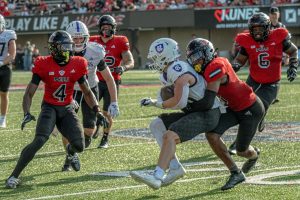Mayor moves to raise city sales tax by 1/2 percent
August 28, 2003
For the past few months, DeKalb city officials and aldermen have analyzed logical measures to ease what is quickly becoming a beleaguered city budget.
Doing so, however, hasn’t come without some disagreements between aldermen, and it could come to a head at the upcoming Sept. 8 council meeting.
For more than two years, DeKalb has had to find alternatives to ensure the city doesn’t fall further onto hard times because of either a lack of funding from the state or decreased health revenues. To combat, DeKalb has considered raising a multitude of city taxes.
Currently, proposed tax increases are being tabled for motor fuel and city sales. The proposal, which calls for a motor fuel increase of two cents per gallon and a city sales tax increase of 1/4 percent, is expected to undergo a final vote on Sept. 8 .
Mayor Greg Sparrow recently voiced his displeasure over a rise in gasoline taxes, citing it as unnecessary and instead wishes to increase the city sales tax alone by 1/2 percent.
In an effort to eliminate the plan before it ever materializes, Sparrow publicly stated he would attempt to veto the proposed motor fuel tax increase. This, however, cannot happen unless five aldermen provide an overriding vote of his veto.
“We have a city council form of government, not a mayoral form of government,” said Fifth Ward Alderman Patrick Conboy, who favors the motor fuel tax and is one of the five votes currently overriding Sparrow. “Our mayor is saying if I don’t agree with what the aldermen say, then I will veto it. Even if the majority want it, he’s going to impose his will and frustrate the process.”
Conboy said he feels it’s difficult to justify a 1/2 percent increase in city sales tax because it would make DeKalb one of the highest sales taxed cities in the state.
“One approach then would be not to increase sales tax significantly and supply money from a gas tax,” Conboy said. “I don’t believe we should fund the whole deficit. We however can cut the shortfall, show some frugality otherwise we’re going to encourage more expenditure and an added burden to the city.”
Fourth Ward Alderman Michael Knowlton, one of the two aldermen supporting Sparrow’s plan to veto a motor fuel tax, said such a tax would promote greater gasoline sales outside of DeKalb.
“You’d see people driving outside of DeKalb looking for cheaper gas,” Knowlton said. “And by raising the sales tax 1/2 percent, we would take care of the deficit and won’t have to revisit this until 2004.”
Knowlton added that a motor fuel tax increase focuses on one group of people whereas a city sales tax would inclusively impact DeKalb residents.
“[Motor fuel taxes] don’t take care of the overall problem at all,” Knowlton said.
Seventh Ward Alderman James Barr, the second alderman to support Sparrow’s veto, said the idea of a motor fuel tax indicates to him that it would provide little advantage to both the city and its residents in the future.
“The simplest solution is not always the best solution,” Conboy said.






